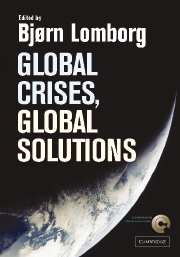Book contents
- Frontmatter
- Contents
- List of figures
- List of tables
- List of boxes
- List of contributors
- Acknowledgements
- List of abbreviations and acronyms
- Introduction
- PART I THE CHALLENGES
- 1 Climate change
- 2 Communicable diseases
- 3 Conflicts
- 4 Access to education
- 5 Financial instability
- 6 Governance and corruption
- 7 Malnutrition and hunger
- 8 Migration
- 9 Sanitation and access to clean water
- 10 Subsidies and trade barriers
- PART II RANKING THE OPPORTUNITIES
1 - Climate change
Published online by Cambridge University Press: 22 September 2009
- Frontmatter
- Contents
- List of figures
- List of tables
- List of boxes
- List of contributors
- Acknowledgements
- List of abbreviations and acronyms
- Introduction
- PART I THE CHALLENGES
- 1 Climate change
- 2 Communicable diseases
- 3 Conflicts
- 4 Access to education
- 5 Financial instability
- 6 Governance and corruption
- 7 Malnutrition and hunger
- 8 Migration
- 9 Sanitation and access to clean water
- 10 Subsidies and trade barriers
- PART II RANKING THE OPPORTUNITIES
Summary
Introduction
This chapter is part of the Copenhagen Consensus initiative of Denmark's National Environmental Assessment Institute. This initiative seeks to evaluate the costs and benefits of alternative public policy actions in a wide range of key policy areas. For comparability, each of the studies in this programme identifies a limited number of policy actions and examines their respective costs and benefits. This chapter examines the issue area of abatement of greenhouse gas emissions to limit future damage from global warming. Three policy strategies are evaluated: (a) an optimal, globally coordinated carbon tax; (b) the Kyoto Protocol; and (c) a value-at-risk strategy setting carbon taxes to limit exposure to high damage. First, however, a considerable portion of this chapter must be devoted to the conceptual framework and key assumptions used in modelling costs and benefits from abatement of global warming.
The next section of this study briefly reviews the state of play in the scientific and international policy deliberations on global warming. It summarises the key findings of the 2001 review of the Intergovernmental Panel on Climate Change (IPCC) and reviews the status of the Kyoto Protocol. The next section discusses crucial methodological components that can drive sharply contrasting results in cost-benefit analyses (CBAs) of global warming abatement, including especially the question of appropriate time discounting for issues with century-scale time horizons. The next section briefly reviews the findings of my own previous studies on this issue as well as those of a leading climate–economic modeller.
- Type
- Chapter
- Information
- Global Crises, Global Solutions , pp. 13 - 61Publisher: Cambridge University PressPrint publication year: 2004
- 7
- Cited by

